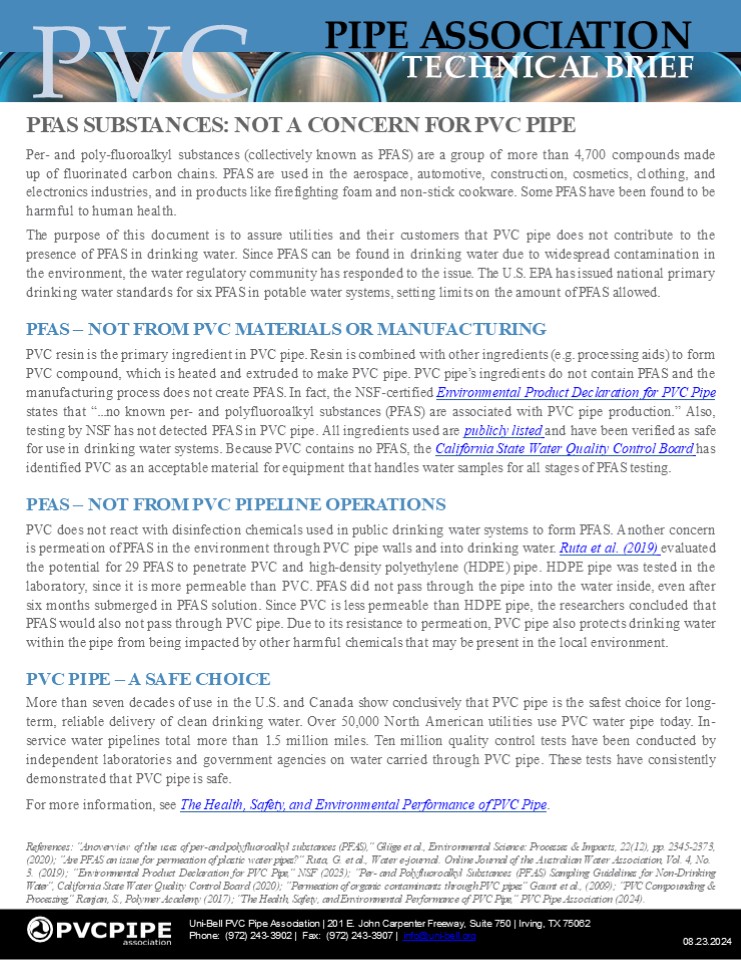PFAS Substances: Not a Concern for PVC Pipe - PowerPoint PPT Presentation
Title:
PFAS Substances: Not a Concern for PVC Pipe
Description:
Per- and poly-fluoroalkyl substances (PFAS) have been widely used in several industries. Unfortunately, medical science has determined that some of these chemicals are harmful to human health. In response, the U.S. EPA has set limits on the amount of PFAS allowed in drinking water. – PowerPoint PPT presentation
Number of Views:0
Title: PFAS Substances: Not a Concern for PVC Pipe
1
PIPE ASSOCIATION
PVC
TECHNICAL BRIEF
PFAS SUBSTANCES NOT A CONCERN FOR PVC PIPE Per-
and poly-fluoroalkyl substances (collectively
known as PFAS) are a group of more than 4,700
compounds made up of fluorinated carbon chains.
PFAS are used in the aerospace, automotive,
construction, cosmetics, clothing, and
electronics industries, and in products like
firefighting foam and non-stick cookware. Some
PFAS have been found to be harmful to human
health. The purpose of this document is to assure
utilities and their customers that PVC pipe does
not contribute to the presence of PFAS in
drinking water. Since PFAS can be found in
drinking water due to widespread contamination in
the environment, the water regulatory community
has responded to the issue. The U.S. EPA has
issued national primary drinking water standards
for six PFAS in potable water systems, setting
limits on the amount of PFAS allowed. PFAS NOT
FROM PVC MATERIALS OR MANUFACTURING PVC resin is
the primary ingredient in PVC pipe. Resin is
combined with other ingredients (e.g. processing
aids) to form PVC compound, which is heated and
extruded to make PVC pipe. PVC pipes ingredients
do not contain PFAS and the manufacturing
process does not create PFAS. In fact, the
NSF-certified Environmental Product Declaration
for PVC Pipe states that ...no known per- and
polyfluoroalkyl substances (PFAS) are associated
with PVC pipe production. Also, testing by NSF
has not detected PFAS in PVC pipe. All
ingredients used are publicly listed and have
been verified as safe for use in drinking water
systems. Because PVC contains no PFAS, the
California State Water Quality Control Board has
identified PVC as an acceptable material for
equipment that handles water samples for all
stages of PFAS testing. PFAS NOT FROM PVC
PIPELINE OPERATIONS PVC does not react with
disinfection chemicals used in public drinking
water systems to form PFAS. Another concern is
permeation of PFAS in the environment through PVC
pipe walls and into drinking water. Ruta et al.
(2019) evaluated the potential for 29 PFAS to
penetrate PVC and high-density polyethylene
(HDPE) pipe. HDPE pipe was tested in the
laboratory, since it is more permeable than PVC.
PFAS did not pass through the pipe into the water
inside, even after six months submerged in PFAS
solution. Since PVC is less permeable than HDPE
pipe, the researchers concluded that PFAS would
also not pass through PVC pipe. Due to its
resistance to permeation, PVC pipe also protects
drinking water within the pipe from being
impacted by other harmful chemicals that may be
present in the local environment. PVC PIPE A
SAFE CHOICE More than seven decades of use in the
U.S. and Canada show conclusively that PVC pipe
is the safest choice for long- term, reliable
delivery of clean drinking water. Over 50,000
North American utilities use PVC water pipe
today. In- service water pipelines total more
than 1.5 million miles. Ten million quality
control tests have been conducted by independent
laboratories and government agencies on water
carried through PVC pipe. These tests have
consistently demonstrated that PVC pipe is
safe. For more information, see The Health,
Safety, and Environmental Performance of PVC
Pipe. References An overview of the uses of
per-and polyfluoroalkyl substances (PFAS), Glüge
et al., Environmental Science Processes
Impacts, 22(12), pp. 2345-2373, (2020) Are
PFAS an issue for permeation of plastic water
pipes? Ruta, G. et al., Water e-journal. Online
Journal of the Australian Water Association, Vol.
4, No. 3. (2019) Environmental Product
Declaration for PVC Pipe, NSF (2023) Per- and
Polyfluoroalkyl Substances (PFAS) Sampling
Guidelines for Non-Drinking Water, California
State Water Quality Control Board (2020)
Permeation of organic contaminants through PVC
pipes Gaunt et al., (2009) PVC Compounding
Processing, Ranjan, S., Polymer Academy (2017)
The Health, Safety, and Environmental
Performance of PVC Pipe, PVC Pipe Association
(2024).
Uni-Bell PVC Pipe Association 201 E. John
Carpenter Freeway, Suite 750 Irving, TX 75062
Phone (972) 243-3902 Fax (972) 243-3907
info_at_uni-bell.org
08.23.2024































